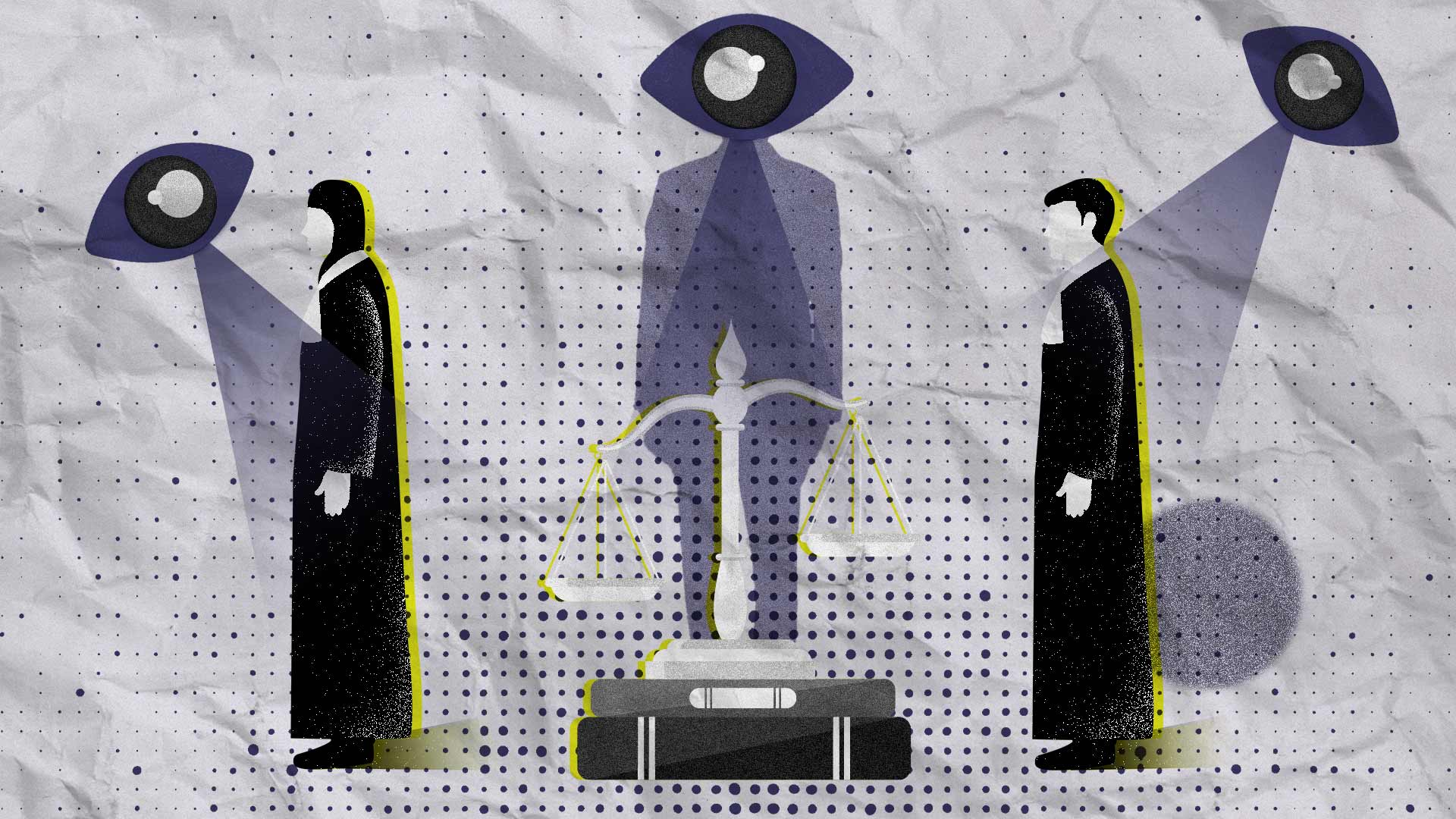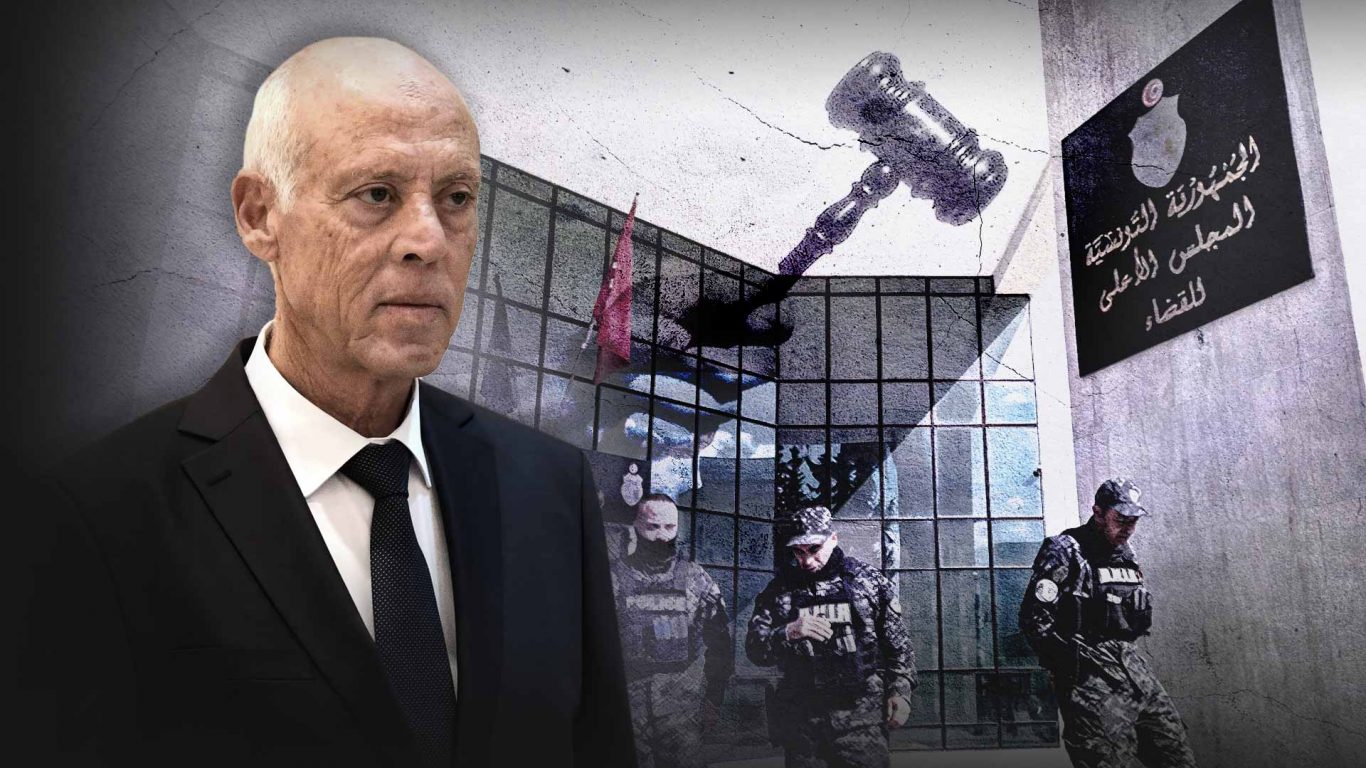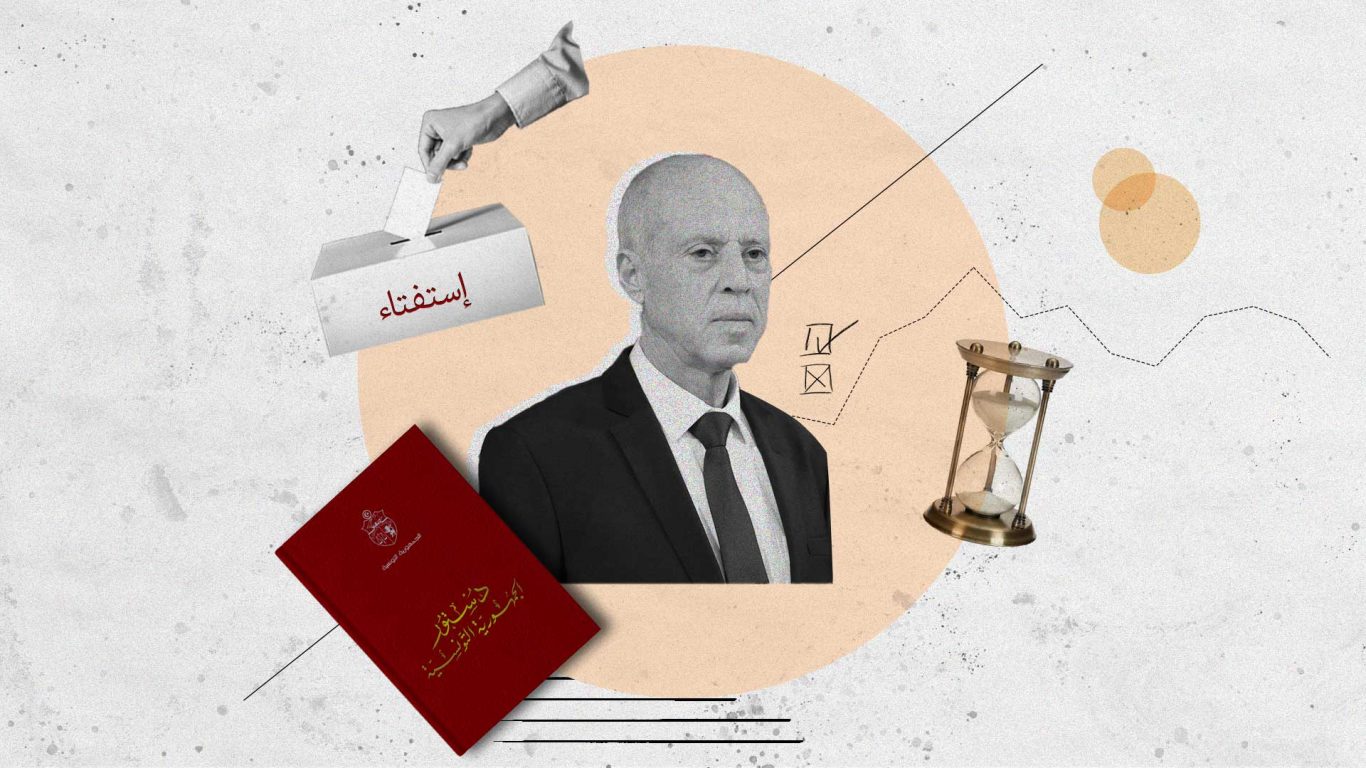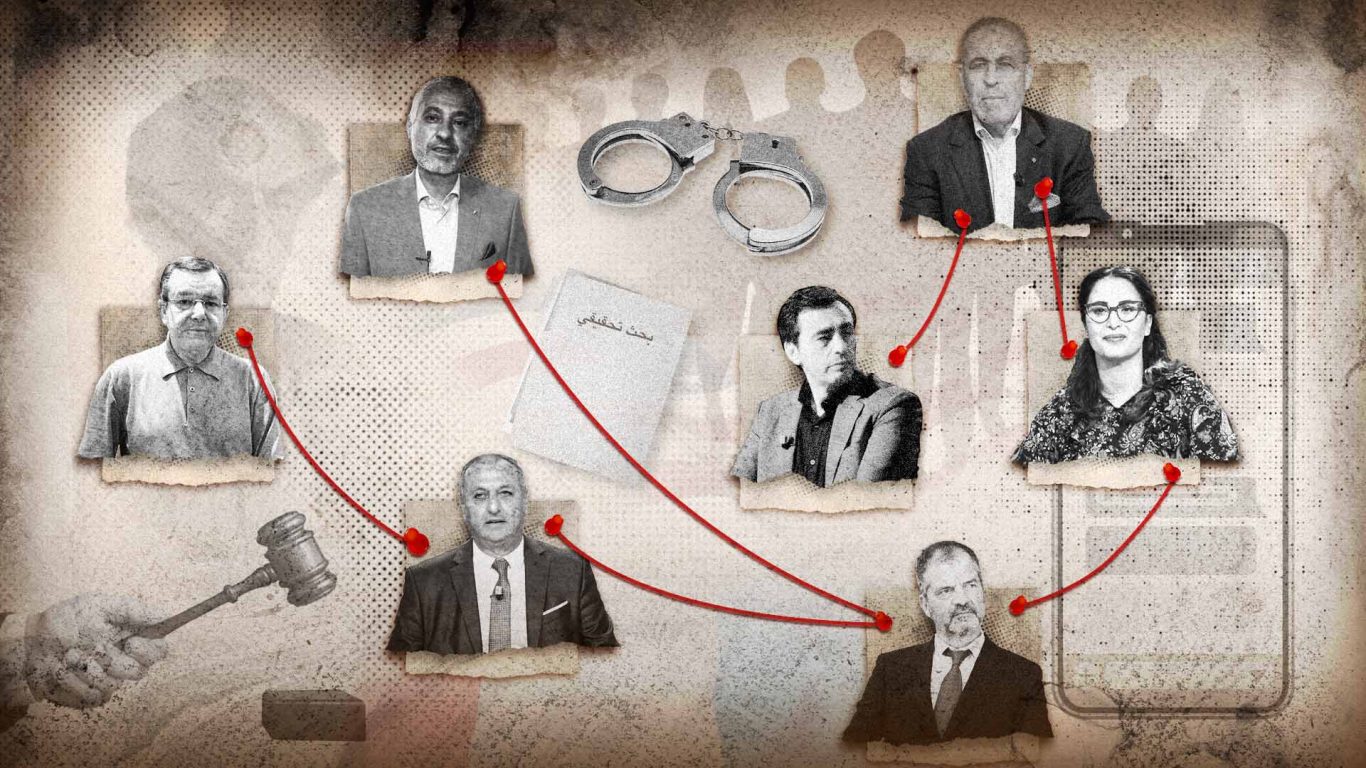Kais Saied's commitment to an independent judiciary was, at the time, in line with the future Head of State's career as a man of law: a lawyer by training, he was Head of the public law studies department at the University of Sousse, then at the Faculty of Law and Political Science in Tunis, between 1994 and 2018.
While he maintained his stance, stating in another interview with Al Jazeera that “justice has yet to live up to the expectations of litigants”, Kais Saied strikingly blamed the judiciary's shortcomings on those times when “politics invaded the courthouses”.
When he seized all power on July 25, 2021, Kais Saied made a speech announcing that he had appointed himself Head of the Public Prosecutor's Office. He then proceeded to gradually disregard all the principles he had previously advocated: dissolution of judicial bodies, arbitrary dismissal of judges, and promulgation of a Constitution subordinating the judiciary to the executive. In just two years, Saied has managed to alienate the judiciary, shattering every last bit of judicial independence.
The judges, Kais Saied's scapegoats
Kais Saied's aggressive attitude towards the Tunisian judiciary has been increasingly prevalent in his discourse ever since July 25, 2021. His criticism of the judiciary began on the day parliament was dissolved: the President justified the exceptional measures put in place by the lack of efficiency on the part of Tunisian judges, accusing them of "burying" certain cases.
The judiciary quickly became one of Kais Saied's main targets. At the beginning of August 2021, 45 judges were placed under house arrest, without prior notice or approval from the Supreme Judicial Council (CSM), which is normally required for such orders.
The 2014 Constitution assigned the CSM the task of guaranteeing the independence of the judiciary and ensuring its proper functioning, for instance, by imposing disciplinary sanctions on judges.
Following July 25, 2021, Kais Saied frequently summoned the President of the CSM to voice his dissatisfaction with the sluggish advancement of its cases. On December 6, during yet another meeting with Youssef Bouzakher and a group of judges, the Head of State was even more insistent on his call for a “ purification” of the judiciary.
A series of statements and pressures that foreshadow the far-reaching upheavals awaiting the Tunisian judiciary and threatening its independence. Kais Saied's main target, the CSM, is the first to suffer the consequences of this approach.
The dissolution of the CSM, an infringement of the independence of the judiciary
On February 12, 2022, the President of the Republic translated his words into actions for the first time, unleashing his fury against the independence of the judiciary. The Official Gazette published Decree no. 2022-11, announcing the outright dissolution of the CSM.
The President of the Council, Youssef Bouzakher, stated that “ Kais Saied has successfully created a public opinion that is hostile towards the CSM.” He further explained that this effort to target the institution stems from Saied’s need to place blame, exemplified by casting allegations of “procedural delays” and “inability to resolve specific cases” onto the CSM. Bouzakher clarified that these issues are outside the Council's jurisdiction.
“The Head of State viewed the CSM as part of an attempt to 'explode' the State from within', as he himself put it”, says Youssef Bouzakher, referring to Kais Saied's statements a year before his coup d'état.
In addition to the dissolution of the CSM, Decree-Law no. 2022-11 also provides for the establishment of a new substitute body: the Provisional Supreme Judicial Council. The key difference with the former CSM lies in its composition, which now relies more on the President's preferences.
On the same subject
“It was an independent and open institution, where two-thirds of its members were elected by their peers,” recalled Youssef Bouzakher. Kais Saied changed this entirely, shifting from an election-based system to an appointment one. According to the Decree-Law, the President must directly select 9 out of 21 members from among retired judges, without establishing any selection criteria, as the former CSM President highlighted.
“The President has granted himself unparalleled powers. This has never been seen before, not even in the pre-2011 system,” declares Youssef Bouzakher.
From judicial “power” to “function”
Already heavily undermined, the independence of the judiciary was permanently buried with the vote in favor of the new Constitution, adopted by referendum on July 25, 2022.
The text no longer mentions executive, legislative or judicial “powers”, but rather “functions”. Chapter 5, devoted to the “judicial function”, is the shortest of the three. Eight articles establish the foundations of Tunisia's new judicial system.
On the same subject
“From a judicial point of view, the new Constitution is rather vague,” confirmed Ayachi Hammami. The lawyer is also disappointed by the absence of any mention of the CSM in the text, even though “its existence was guaranteed in the former Constitution.” “The 2014 Constitution represented the result of the struggle of Tunisian judges, and the judicial family in general, since independence,” said Youssef Bouzakher.
The new Constitution is, above all, fits in perfectly with the series of Decree-Laws issued since July 25, 2021. The new Constitution grants Kais Saied full authority over the composition of the provisional CSM, as well as the right to dismiss judges if he so wishes.
“ From a structural point of view, we can no longer talk about an independent justice system in Tunisia,” stresses Ayachi Hammami.
Despite this substantial erosion of the judiciary's power, judges and civil servants “may refuse to carry out manifestly unlawful orders or acts”, commented Ahmed Souab, a former administrative judge, in reference to international law jurisprudence during an episode of inkyfada podcast's “inkytalk”.
"The issue is that judges are even carrying out what is evidently illegal,” he protests.
Dismissing judges and instigating fear
After dissolving the CSM, Kais Saied shifted his focus straight to the judges. On June 1, 2022, the Official Gazette published the peculiar Decree-Law no. 2022-35. This brief text granted the Head of State an unprecedented authority in Tunisian history: the power to dismiss any judge, under certain conditions, by simple Presidential decree.
Presidential Decree 516, published in the same Official Gazette, dismisses 57 judges. The order gives no information about the reasons for this decision. “It came as a complete surprise to everyone,” said Ayachi Hammami, a lawyer by profession and spokesman for the dismissed judges' Defense Committee.
Under the terms of Decree no. 2022-35, legal action must automatically be taken against dismissed judges. The latter are entitled to dispute the decision, and a judge may ask to be reinstated, but only after having been tried for “the facts attributed to them”. In other words, Presidential Order 516 leaves the dismissed judges with little to no hope of being reinstated, and it effectively treats them as if they are accused, without any evidence of guilt.
“To this day, I don't know any country where the Head of the Executive can dismiss a judge, without respecting the principle of confrontation, without giving them the right to review their case file beforehand or present their defense, essentially without any procedural safeguards,” Ayachi Hammami protests.
Some of them are prominent figures in the judiciary, like Mohamed Kamoun, Senior Investigating Judge at the Tunis Court of First Instance. Public Prosecutors of the Courts of First Instance in the Governorates of Zaghouan, Tunis, Manouba, Ariana, Bizerte, Le Kef, Nabeul and Gafsa have also been dismissed with no replacement. Ayachi Hammami noted that this has inevitably slowed down the work pace.
Decree-Law no. 2022-11 also grants the Head of State the power to carry out annual rotations of judges. But these haven't been approved for the year 2023, and most of the positions previously held by dismissed judges are still vacant. A handful of the capital's most crucial posts were filled at the end of May 2023: President of the Tunis Court of Appeal, Public Prosecutor at the Tunis Court of First Instance, Senior Investigating Judge at the Court of First Instance, etc.
“In an equally unlawful manner, the Minister of Justice has decided to appoint new judges,” explains Ayachi Hammami. “But she only chose judges who are 'under her thumb' and who follow her orders”.
An illegal procedure
Kais Saied's reasons for this decision were initially revealed in a televised speech broadcast on the same day. The President of the Republic made reference to obstruction of investigations into terrorist cases, as well as financial corruption. However, out of the 57 dismissed judges, only 8 were already facing legal proceedings, and Presidential Order 516 did not include any specific reasons for the layoff of the other judges. They weren't even formally informed that their dismissal would take place that day.
“Even the corrupt can now claim to be a victim. By ordering these arbitrary dismissals, Kais Saied didn't fight corruption, but rather enabled it, since they're all victims of an illegal procedure now”, says Ayachi Hammami.
The President of the Republic was quick to mention “moral corruption” and participation in “drunken parties” in his speech to justify the dismissal of certain judges. Yet, Kheira Ben Khelifa, who was dismissed for adultery, was acquitted on January 19, 2023, after the court ruled in her favor and the charges were dropped.
Ayachi Hammami described the case as “a tragedy”, especially since rumors had initially been spread about the other six women judges who had been dismissed, alleging that they had been implicated for this very reason. “Kheira Ben Khelifa eventually decided to say it was her at a press conference,” said the lawyer. “She took the blame so that the others would be left alone. She was incredibly strong.”
Many of the accused openly criticized Kais Saied through the media, or were in conflict with law enforcement agencies. Such was the case with Mahdia's Deputy Public Prosecutor, Ramzi Bahria, who faced charges related to orchestrating a terrorist plot and withholding information, as respectively specified in articles 32 and 39 of the 2015 anti-terrorism law. During an emergency meeting of the national council of the Association of Tunisian Judges (AMT) convened on June 4, 2022, Ramzi Bahria explicitly stated that his dismissal was linked to the police raids carried out by law enforcement under the guise of combating terrorism. His decision to protest against this was motivated by the fact that these operations had targeted eight homes without valid reasons or details about the individuals in question.
Some dismissals also seem to undermine the judges' freedom of expression. Many of those who have been dismissed claim that the decision came as a result of their criticism of the Government. Hamadi Rahmani, a Court of Cassation judge, has been charged with offending the Head of State under article 67 of the Criminal Code. He faces a prison sentence of up to three years for a Facebook post in which he denounced Kais Saied's power grab on July 25, 2021. Mourad Messaoudi, a judge at the Tunis Court of Appeal, was also allegedly targeted because of his role as president of the Tunisian Association of Young Judges (ATJM). His association has frequently criticized the President since July 25, 2021, and called on judges to join forces in a bid to safeguard the independence of the judiciary*.
Unlawful dismissals and pending charges
Most of the dismissed judges refused to remain idle in the face of pressure. Aside from media appearances and symbolic actions such as hunger strikes for some of them, the majority have decided to take their case to the Supreme Administrative Court.
Given its constitutional power to overturn administrative measures, the Administrative Court quickly ruled in favor of the judges on August 10, 2022. Out of the 57 dismissed judges, the 49 judges without any pre-existing legal actions against them prior to the issuance of Decree 516 were, on paper, reinstated in their positions. This provision gained significant momentum a few days later, when the Ministry of Justice announced the initiation of 109 legal proceedings against all the dismissed judges. At least 13 of these 109 cases were referred to the Counter-Terrorism Judicial Pole at the end of December 2022.
The Administrative Court's decision was largely based on the fact that the Provisional Supreme Judicial Council had been “unable to provide sufficient concrete evidence” to support its decision to dismiss the judges in question.
However, the decision made by the Administrative Court had no effect. The judges weren't reinstated, an unlawful state of affairs that prompted 37 judges to take action and file a complaint against the Ministry of Justice on January 23, 2023, for non-application of the Administrative Court's ruling, under article 315 of the Criminal Code.
Ever since, the accused have been waiting for two developments. For one thing, the Government has not yet implemented the Administrative Court's decision, as the judges weren’t reinstated.
“The non-execution of a judicial decision is a criminal offence,” affirms Ayachi Hammami.
For another thing, the Investigating Judges appointed by the Ministry of Justice to look into the cases of dismissed judges have decided to ask the provisional CSM to lift the immunity of the accused before starting to review their case files. “The Public Prosecutor's Office is normally the one in charge of referring the case to the CSM. This extremely essential procedure was completely overlooked”, added Ayachi Hammami. The decision is expected on September 19.
The dismissals, and the subsequent legal battle, have instilled a deep sense of discouragement among the judges still in office. “The judges who weren't dismissed are terrified,” said Ayachi Hammami. “And this climate of terror is what undermines independence.”
Using the justice system to eliminate the opposition
Aside from the case of the dismissed judges, Ayachi Hammami is also being prosecuted for his critical stance towards the Government. In this respect, his case reflects the growing trend of legal proceedings and investigations being initiated against those who challenge the excessive actions of the Head of State.
With its independence considerably eroded, the judiciary became one of the Government's key weapons. In February 2023, 17 people, including civil servants, journalists and businessmen, were arrested for “plotting against State security”. Their cases were swiftly brought to trial.
On the same subject
Any judges still in office who refuse to comply with Kais Saied's strategy against his opponents are now directly at risk. The Investigating Judge of Office 23 of the Counter-Terrorism Judicial Pole, who refused to issue an arrest warrant for one of the accused, was suspended by the Ministry of Justice. This serves to further prove that independence of judges in Tunisia has been compromised.
“The President has created a climate of fear where, in his own words, 'anyone who acquits them is their accomplice',” comments Ayachi Hammami.
On February 10, 2023, the Anti-Terrorism and Organized Crime National Unit sent a letter to the Minister of Justice, Leila Jaffel. This was confirmed by the detainees' lawyers. That same day, the letter was sent to the Public Prosecutor at the Tunis Court of First Instance, instructing them to "undertake and authorize the necessary investigations". In response, the Prosecutor assigned the investigation to the Security Unit.
It is also noteworthy that the Minister of Justice has directly issued written instructions to the Public Prosecutor, authorizing them to conduct investigations. Yet, under the Code of Criminal Procedure and the principle of independence of the judiciary from the executive, the Minister of Justice has no power over the Public Prosecutor's Office, nor any authority over its members.
“The case files are empty, but they keep growing,” says former judge Ahmed Souab.
As a case in point, he recalled the arrest of Noureddine Boutar, CEO of Mosaïque FM radio. On February 13, in a matter of hours, the journalist was sent to the Public Prosecutor - following a tip-off from a security unit - who then referred him to the Counter-Terrorism Judicial Pole. After being transferred to the Criminal Records Department and then to the Financial Crime Investigation Unit, Noureddine Boutar was finally arrested.
The journalist was the ninth person to be arrested in less than two days. Political activists, businessmen, former Ennahdha leader, civil servants... A total of 17 people have been arrested and charged under Tunisia's anti-terrorism law and Criminal Code with “plotting against State security”. The case, quickly dubbed the “affair of the 17”, involves several members of the opposition.
“The President and the Minister of Justice are plotting against the Tunisian opposition with such serious accusations. They're using the anti-terrorism law which allows them to detain people for 15 days, to deny them legal counsel for 48 hours, and above all to add anonymous testimonies which can't really be challenged, and which conveniently contain all the accusations,” denounced Ayachi Ammami.
The lawyer pointed out that these laws provide for long prison sentences and even the death penalty. “From my perspective, Kais Saied's orders were carried out with the intention of wiping out the Tunisian opposition. I call this a Government conspiracy against the opposition, not an opposition conspiracy against the Tunisian State”, he concluded.







